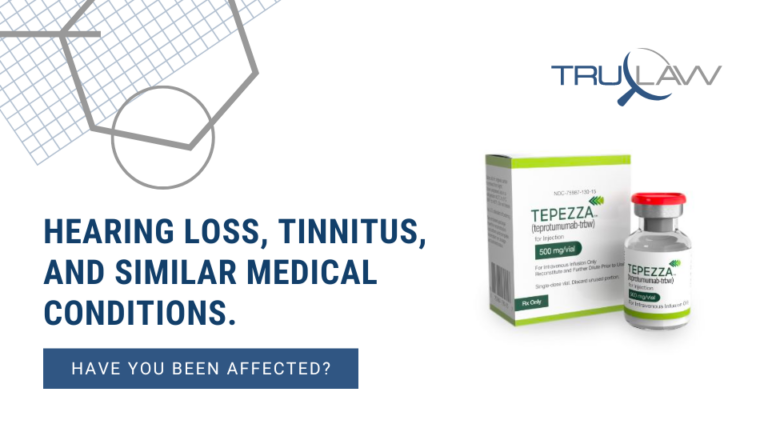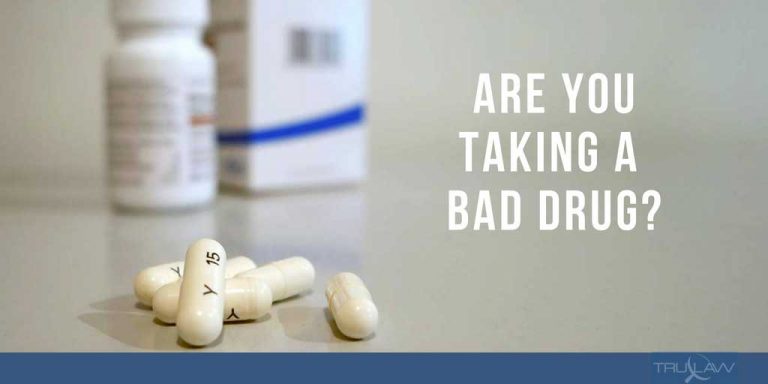Fluoroquinolone Antibiotic Lawsuits
- Last Updated: March 18th, 2024

Attorney Jessie Paluch, founder of TruLaw, has over 25 years of experience as a personal injury and mass tort attorney, and previously worked as an international tax attorney at Deloitte. Jessie collaborates with attorneys nationwide — enabling her to share reliable, up-to-date legal information with our readers.
Legally Reviewed
This article has been written and reviewed for legal accuracy and clarity by the team of writers and legal experts at TruLaw and is as accurate as possible. This content should not be taken as legal advice from an attorney. If you would like to learn more about our owner and experienced injury lawyer, Jessie Paluch, you can do so here.
Fact-Checked
TruLaw does everything possible to make sure the information in this article is up to date and accurate. If you need specific legal advice about your case, contact us by using the chat on the bottom of this page. This article should not be taken as advice from an attorney.
Overview of the Fluoroquinolone Antibiotic Lawsuits

Popular antibiotics including Levaquin, Cipro, Avelox, and Factive are tied to life altering complications including:
- Aortic Aneurysm
- Aortic Dissection
- Valvulopathy
- Peripheral Neuropathy and others.
Table of Contents
FDA Warns – Systematic use of Cipro, Levaquin and other antibiotics can lead to disabling and serious side effects
Antibiotics are a class of drugs that can effectively stop dangerous bacterial infections in their tracks by eliminating the growth of bacteria or killing it all together.
However, the FDA is now warning that in the case of fluoroquinolones (FQs) antibiotics, these drugs may carry unwanted and serious side effects that were not previously warned about.
In November 2015, an FDA committee advisory meeting heard the testimonies of more than 30 members of the public regarding the life-altering injuries they have lived with and they believe were linked to their FQ treatment.
Although the FDA advisory panel overwhelmingly agreed that there needed to be changes made to the FQ labels and recommended as much to the FDA, it took until May 2016 for the FDA to take action on warning the public about the dangers of fluoroquinolones antibiotic use.
FDA Warning
According to the FDA Safety Communication systematic use of fluoroquinolones (such as Cipro, Levaquin, Avelox, Floxin and Factive) is associated with disabling and potentially permanent serious side effects that can occur together.
These side effects can involve the tendons, muscles, joints, nerves and central nervous system.
While the FDA Advisory recommended the use of the term “fluoroquinolones associated disability” (or FQAD) to describe the potentially permanent serious side effects that can occur together, the FDA stopped short of naming this disability.
Despite the lack of a name, these serious side effects will now be the subject of a strengthened warning on the fluoroquinolone family of antibiotics, which includes such drugs as Levaquin, Cipro, Avelox, Factive and Floxin.
These labels will now include a “limitation of use” so that it is no longer appropriate for medical professionals to prescribe one of these antibiotics to treat sinusitis, bronchitis or an uncomplicated urinary tract infection.
According to the FDA, serious side effects associated with these popular antibacterial drugs outweigh the benefits for patients with sinusitis, bronchitis, and uncomplicated urinary tract infections who have other treatment options.
Fluoroquinolones Overprescribed
Fluoroquinolones (FQs) have been used for over 20 years and critics note that they are overprescribed.
According to the CDC, FQs are the fourth-most prescribed antibiotic nationwide – prescribed to 33 million Americans in 2013 alone.
In the past few years, advocates have worked hard to get word out about the serious side effects from FQ toxicity.
These individuals, many of whom are currently suffering from these life-altering side effects, refer to these collective injuries as “floxing” and “antibiotic toxicity.”
They have set up Facebook pages and website in an effort to get word out through social media.
The FDA warning and label change will be helpful in these efforts to get word out to the public but also to get word to health care professionals who often come up with no specific diagnosis for the constellation of symptoms from these antibiotics.
Fluoroquinolone Side Effects
Aortic Aneurysm
An aortic aneurysm is a lump in the aorta which is the body’s main artery.
The aorta carries oxygen-rich blood out from the heart to the other areas of the body.
The bulging section with the aneurysm is overstretched and weak which can lead it to burst.
A burst in the aorta can cause serious bleeding which may quickly lead to death.
Aortic Dissection
Aortic dissection is a tear in the inner layer of the aorta.
The aorta is the main blood vessel branching off of the heart which carries oxygen-rich blood throughout the body.
When dissection occurs, blood surges through the tear causing the inner layers of the aorta to break apart (dissect).
If this rupture penetrates the outer wall of the aorta, the outcome of aortic dissection is often fatal.
A Constellation of Disorders
Symptoms affecting the tendons, muscles, joints, nerves and/or central nervous system.
See the complete list on our Fluoroquinolone Lawsuit Qualification Form.
Peripheral Neuropathy
Peripheral neuropathy is the outcome of damage to peripheral nerves.
Side effects are often weakness, pain, and numbness usually in your hands and feet but may also affect other areas.
Many people diagnosed with peripheral neuropathy will describe the pain as stabbing, tingling, or burning.
Peripheral neuropathy can result from toxins and is currently being linked to fluoroquinolone antibiotics.
Cardiac Valvulopathy
Cardiac Valvulopathy is a condition in which the heart valve becomes inflamed and stiff.
A heart valve must remain closed during a period in the blood flow cycle.
When the blood is not retained adequately in the valve during this cycle, the blood can be returned to the previous chamber in the heart.
This “valvulopathy” causes damage in the heart which for many now being linked to the use of fluoroquinolone antibiotics.
Antibiotic Lawsuits Moving Forward
Lawsuits on behalf of individuals living with these serious injuries are being filed against the manufacturers of Levaquin, Cipro, Avelox, Factive and Floxin alleging that these drugs put individuals at risk of injury.
According to these antibiotic lawsuits, the manufacturers did not properly warn of the risk of these popular antibiotics.
Furthermore, many of the individuals injured by Cipro, Levaquin or one of the other fluoroquinolones was prescribed the drug for the treatment of illnesses that were likely to be resolved on its own such as a urinary tract infection, sinusitis, bronchitis or other illnesses.
Frequently Asked Questions
-
How Do I Pick an Antibiotic Lawyer?
Sometimes you need a lawyer near you and sometimes its best to hire a lawyer based on the lawyer’s resources and experiences.
The right lawyer for mass-tort litigations may not be your local lawyer.
Mass tort cases filed all over the country are often consolidated into a single courtroom in order to move the many lawsuits through the courts in the most effective and efficient way.
A lawyer experienced with the multidistrict litigation process with the ability to represent clients in all 50 states, is likely to be a good fit for mass tort litigation.
TruLaw is not afraid to take on the largest drug and medical device companies in the world.
We work with trusted legal affiliates to make sure that TruLaw clients have the resources and experiences needed to hold big business accountable when they put profits over people.
-
How Can an Antibiotic Lawsuit Help?
Your lawsuit is designed to help you financially recover from injuries that were caused by someone else.
We hope putting your trust in TruLaw will take away your concern of protecting your legal rights., but it is most important to us that you spend your time recovering physically.
Your lawsuit should assist in covering your medical bills, the amount of income and benefits that you lost as a result of your injury and, if your injuries are permanent, we will look to recover for your permanent disfigurement.
In addition, it is always our hope that your lawsuit will help us to remove dangerous drugs, toxins and devices from the market.
We are not only lawyers, but also safety advocates that believe in getting information out to the public so no more people are injured.
We hope you will join us in the role as a safety advocate.
-
Has There Been an Antibiotic Lawsuit Settlement?
We understand the frustration in waiting to hear about settlements in product liability lawsuits.
Unfortunately, in drug and device cases, we have no choice but to sue some of the most profitable companies in the world.
Big Pharma has deep pockets and lawsuits are a cost of doing business for them.
They are not inclined to settle until it makes business sense to them.
TruLaw lawyers building our cases with an eye on winning in court as well as settlement, when we believe that is the best result for our clients.
We will never settle without advising you of your options, and we will keep you posted on our progress, to the extent we are legally able.
-
Is there an Antibiotic Class Action?
We often hear injured people refer to their personal injury case as a “class action” because their case was grouped together in a lawsuit with other injured people.
This is most often NOT the case.
Often, individual cases are grouped together so the attorneys and judge can address common procedural issues initially, saving time for the injured parties and the court, but this is very generally referred to as a “mass tort.”
A Mass tort refers to civil actions involving numerous plaintiffs against one or a few corporate defendants in state or federal court.
Class actions are mass torts that are generally used on financial losses and multidistrict litigations (MDL) are generally used on personal injury claims, often in product liability cases.
MDL is a procedural tool used when plaintiffs have incurred injuries from products manufactured by the same defendant(s).
Even when plaintiffs incur injuries from the same defendant(s), the amount of damages they may recover for those injuries are often substantially different from other plaintiffs included in the same lawsuit.
It is important to understand that mass tort cases are an effective tool to getting the attention of the large drug and device companies.
MDLs assist lawyers in determining exactly what the drug and device companies knew about the risks their products caused and whether or not they should have warned consumers.
Too often, consumers believe that they can file a single lawsuit and get the attention of big drug companies.
This is very hard to do.
Technically, MDLs do not happen until a judicial panel transfers individual cases to a single court.
Depending on when your lawsuit is filed, you may find yourself automatically transferred to the MDL court or you may wait to learn when and if the JPML believes an MDL is the proper venue for the mass tort.
But, rest assured, even if your case is included in an MDL, TruLaw lawyers will treat your injuries, your medical history and your financial needs separately.
We are aware that not all cases are the same.
-
Why is there an Antibiotic Lawsuit?
A corporation, by definition is profit seeking. There is no requirement that a corporation act morally.
Unfortunately, too often we see dangerous drugs, devices and products remain on the market when corporations prioritize profit over people.
If these same corporations warn consumers of these risks, there is no case.
We only pursue lawsuits on behalf of individuals who were not warned of the risk associated with the dangerous drug, device or product on the market.
TruLaw is pursuing Antibiotic lawsuits against the manufacturers of Levaquin, Cipro, Avelox, and Factive because we believe consumers were not properly warned of the risks of injury.
-
Have you seen an Antibiotic Lawsuit Commercial?
Did a recent Antibiotic Lawsuit commercial grab your attention?
Did you find our site because you were wondering if you qualify for the Levaquin, Cipro, Avelox or Factive lawsuits?
We built the Antibiotic Instant Case Evaluator ℠ as a no cost/no obligation place for you to find answers about your legal rights.
If you found us today, you are looking for instant answers to whether you should file an Antibiotic lawsuit and we want to help you.
We believe that in order for you to make important decisions about your health and your legal rights, you need to start with information.
We provide you this valuable information so you are prepared to talk to a lawyer.

Experienced Attorney & Legal SaaS CEO
With over 25 years of legal experience, Jessie is an Illinois lawyer, a CPA, and a mother of three. She spent the first decade of her career working as an international tax attorney at Deloitte.
In 2009, Jessie co-founded her own law firm with her husband – which has scaled to over 30 employees since its conception.
In 2016, Jessie founded TruLaw, which allows her to collaborate with attorneys and legal experts across the United States on a daily basis. This hypervaluable network of experts is what enables her to share reliable legal information with her readers!
Here, at TruLaw, we’re committed to helping victims get the justice they deserve.
Alongside our partner law firms, we have successfully collected over $3 Billion in verdicts and settlements on behalf of injured individuals.
Would you like our help?
At TruLaw, we fiercely combat corporations that endanger individuals’ well-being. If you’ve suffered injuries and believe these well-funded entities should be held accountable, we’re here for you.
With TruLaw, you gain access to successful and seasoned lawyers who maximize your chances of success. Our lawyers invest in you—they do not receive a dime until your lawsuit reaches a successful resolution!
Do you believe you’re entitled to compensation?
Use our Instant Case Evaluator to find out in as little as 60 seconds!
Camp Lejeune’s water contamination issue spanned several decades starting in the 1950s. Exposure to these chemicals has been linked to various serious health issues, including cancer, organ diseases, and death.
Research is increasingly suggesting a link between the use of Tylenol during pregnancy and the development of neurodevelopmental disorders, such as autism and ADHD, in infants.
Legal action is being taken against manufacturers of Aqueous Film-Forming Foam (AFFF), a chemical used in fighting fires. The plaintiffs allege that exposure to the foam caused health issues such as cancer, organ damage, and birth and fertility issues.
Here, at TruLaw, we’re committed to helping victims get the justice they deserve.
Alongside our partner law firms, we have successfully collected over $3 Billion in verdicts and settlements on behalf of injured individuals.
Would you like our help?


